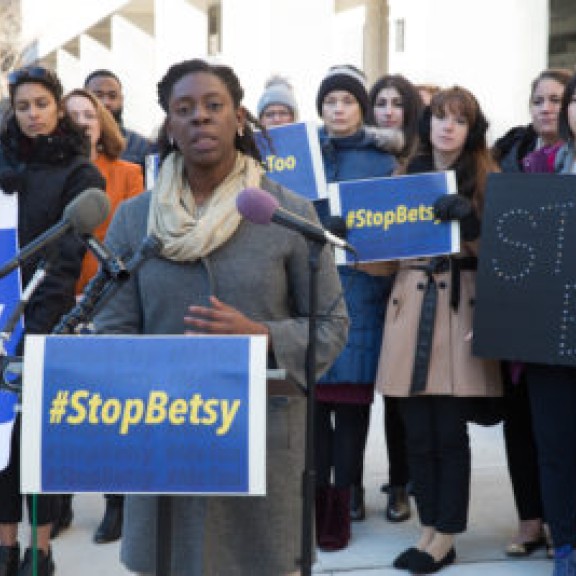Trump Administration Sued Over Title IX Guidance
Lawsuit Alleges Discrimination Against Student Survivors Of Sexual Violence
The National Center for Youth Law (NCYL) filed suit last month against U.S. Secretary of Education Betsy DeVos and the Trump Administration to strike down their discriminatory attacks on Title IX protections for survivors of campus sexual violence and harassment. The lawsuit, filed on behalf of advocacy organizations SurvJustice, Equal Rights Advocates, and Victim Rights Law Center, contends that Trump and Betsy DeVos’ new Title IX policy rolls back protections for survivors that are particularly critical to providing equal access to education to women and girls. According to the complaint, the Trump administration’s new Title IX policy was issued unlawfully and is based on discriminatory beliefs about women and girls as survivors of sexual violence, in violation of the Constitution. NCYL is joined by the National Women’s Law Center and Democracy Forward in representing the plaintiffs.
The lawsuit comes in the midst of a national conversation sparked by the #MeToo movement, about the prevalence and devastating impact of sexual violence and harassment in schools and the workplace. In the face of this outpouring of survivor accounts of sexual harassment and violence, the Trump Administration--guided by a discriminatory and baseless belief that women and girls often lie about sexual harassment and violence --has enacted an extreme and unconstitutional Title IX policy that hurts survivors.
The Administration’s policy reverses course on more than twenty years of legal guidance in order to give special rights to those accused of sexual harassment, while undermining the girls and women who come forward. The Trump Administration’s new policy permits schools to institute one-sided appellate right policies that allow a student accused of sexual assault to appeal an unfavorable investigative outcome, while denying survivors of sexual assault that same right. Further, the policy allows schools to resolve claims, including those alleging sexual violence, through mediation. And perhaps most troublingly, the new guidance allows schools not to issue interim measures - like moving out of a residence or changing class schedules - to protect the person complaining of sexual assault from further harassment or violence during the investigation of the complaint.






